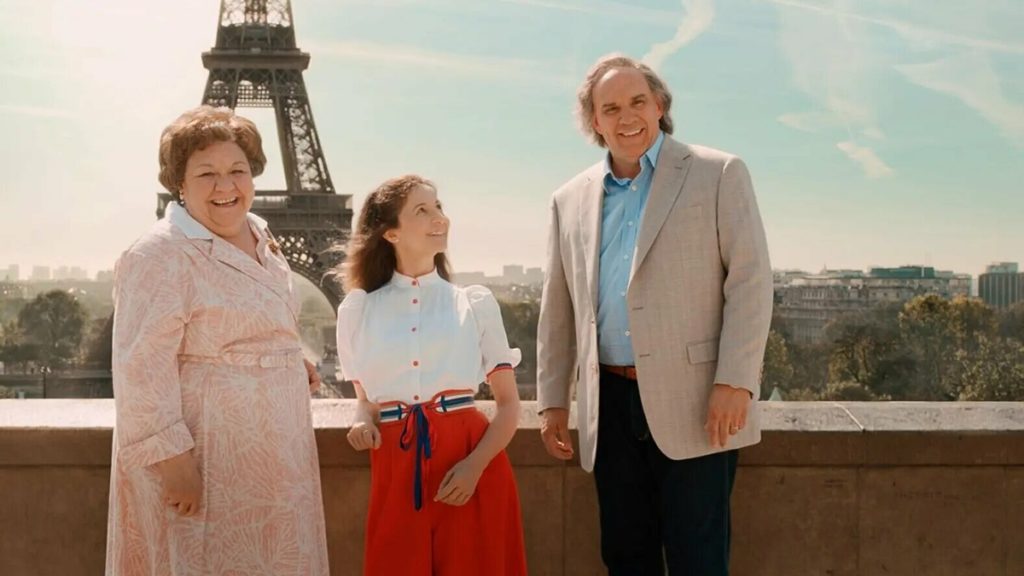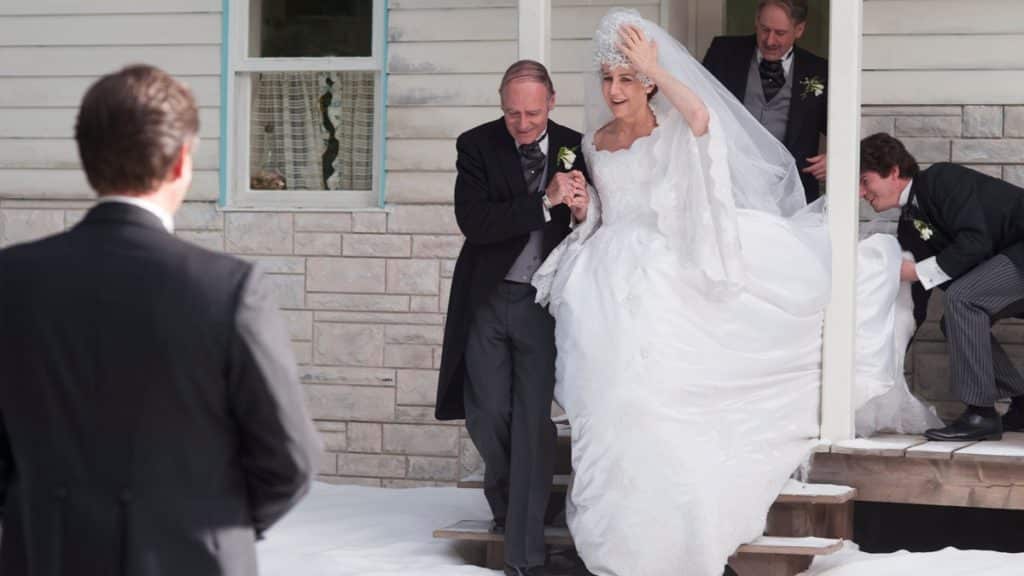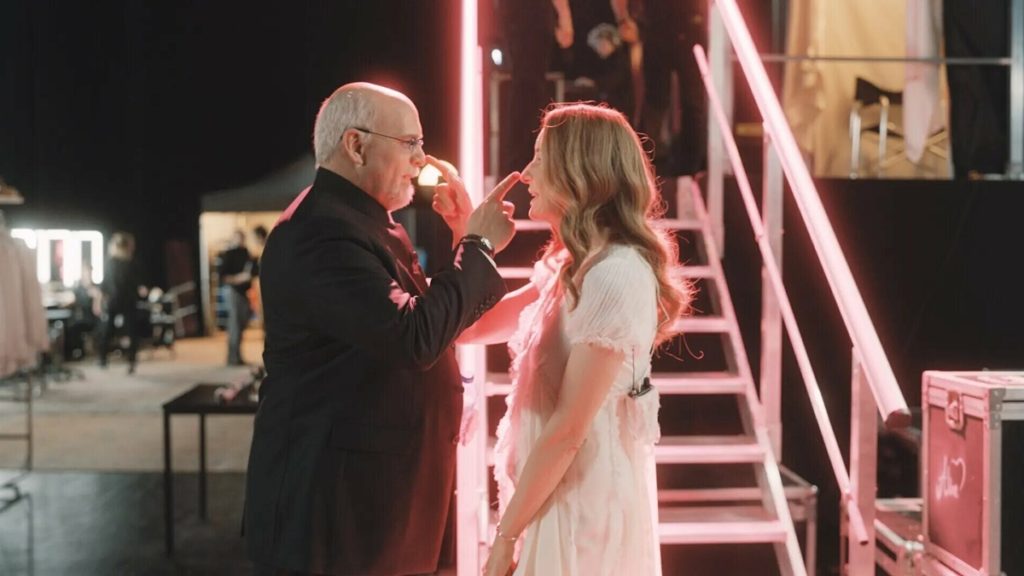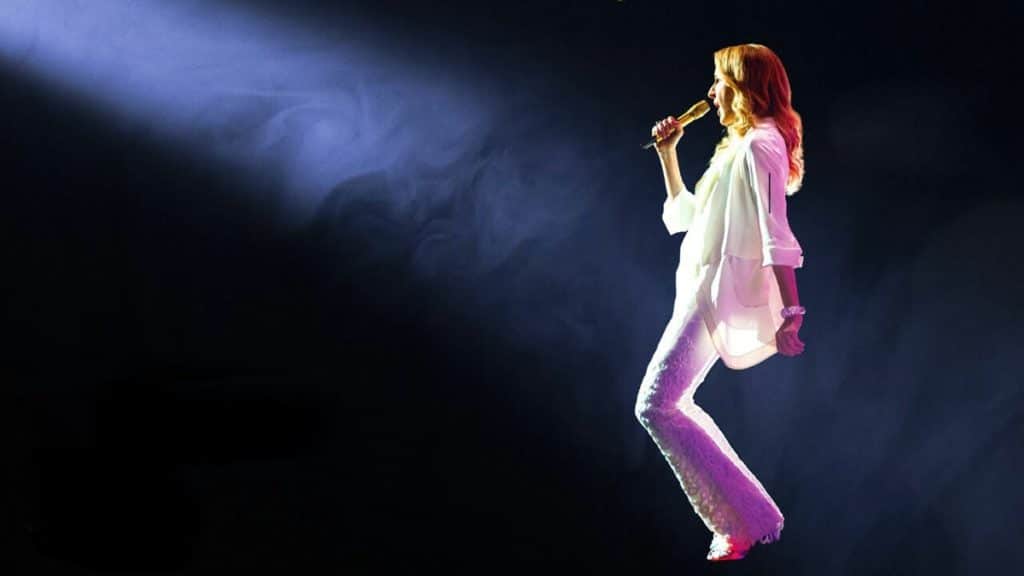Read also:
How to Watch FX Live Without CableHow To Watch AMC Without CableHow to Watch ABC Without CableHow to Watch Paramount Network Without CableThe barely legal biopic feels the specter of Celine.
A woman wanders a vast and empty house. Her eyes well with confusion as she seems to disappear through walls. She’s a specter in her own home, unfamiliar amongst what should be the most familiar. But she’s not a ghost. She’s just lost.
Valerie Lemercier’s Aline is haunting. Its residue still hasn’t left my brain. The form is mysterious and ineffable. Its tones cascade from surreal comedy to maternal melodrama. It lingers at times. At others, it passes by at shimmering speed. It exists between planes: fantasy & reality, legal & illegal.
Like all good ghosts, Aline gains depth by what it doesn’t say and, in this curious case, what’s forbidden to say. Lemercier’s film presents deftly illuminating and satirical hauntological theories. They should be considered alongside those in Larrain’s Sad White Lady Series.

Aline’s first half follows Celine’s life pretty much to the letter. (“Aht! Aline,” Maman Dieu reminds.) Aline is a surprise fourteenth child to elder parents in the backwoods of French Canada. Though the large family is an orchestra of musical talents, petite Aline soon steps out in front with a voice beyond her age.
After some encouragement and support from her family, she sends a demo tape to Guy-Claude Kamar (Sylvain Marcel), music manager and micro-ponytailed savant, who quickly sees the treasure placed in his lap. With Guy-Claude and her mom by her side, Aline quickly climbs the Canadian chanson charts, becoming known as the little girl with the big voice. Her remarkable talents led her to represent her country in an international music competition meant to find a new vision of Euro-pop. Wink.
Though her win cements her as a Canadian icon, Aline wants more. She wants to be an international superstar, almost as much as she wants to marry Guy-Claude. Everyone around her is hesitant, especially her parents. This isn’t what good Catholic girls do. Yet Aline’s firm in her desires, and once she’s in her early twenties, she and Guy finally wed.

Once Aline’s achieved both of her initial dreams, the picture shifts to a maternity melodrama. There, Aline struggles to conceive. The difficulty is brief, however, and soon she welcomes twin boys into her life. Finally, to achieve work/life balance, Aline takes up a musician’s residency in Las Vegas, which allows her to quickly scuttle between the stage and her stately mansion on the outskirts of town with her family.
Time moves quickly while Aline has everything she ever wanted, even getting a surprise in a set of twins. But Guy-Claude’s health quickly deteriorates. As Aline struggles to keep her composure and career as she loses the loved ones around her, she must learn to find strength within herself to continue alone, for her heart will go on.
Through Emmanuelle Duplay’s practical sets, some lighting effects, and a touch of CGI, writer/director Lemercier plays Aline from five to fifty. Some may dwell on the impact of this “uncanny valley,” it’s essential to realize the full functions of this choice. It’s firstly an excellent touch of Quebecois surrealism in the vein of fellow Canadian director Matthew Rankin’s The Twentieth Century (2019), which stretches the truth of biography and mise en scene in a similar fashion. The silliness and scale that Lemercier will play with for the remaining two hours as Aline continually finds herself feeling small in new settings are clear from the start. Though she graduates from under the banquet table to a mansion and later whole arenas, Aline’s still the little country girl at heart.
The film’s unevenness isn’t the result of weak story construction. It’s the result of conscious editing out of life.
A refreshing sense of the ridiculous pervades the film’s first half, and it’s primarily due to the absurdity of Aline’s “aging.” Having a woman in her fifties play a child also provides a beautiful burlesque of youthful idealism. Aline’s stubbornness and determination become tinged with a knowing wink.
Herein lies the first critique of this device. Aline has an adult voice for such a young child, but as her age catches up with her voice, the jocularity we love Celine for gets lost in the over-weighted melodrama of the later parts of the film. The film’s back half is a missed opportunity for more comedic work— after all, Celine has never lost her childlike sense of wonder and amusement.
Not that the early part of the film lacks for microdramas. The most useful part of having Lemercier play Aline all the way through is that it helps alleviate some of the itchiness around Aline and Guy-Claude’s relationship—the age gap and that he’d been her manager since she was twelve. The official narrative has always been that both parties waited until the finalization of Renee’s second divorce and her eighteenth birthday. Still, that doesn’t soothe the discomfort of watching the relationship bloom as “entertainment.”

But by having an adult playing young Aline, Lemercier avoids recreating the relationship. This allows us to consider Aline’s perspective while still agreeing with Maman Dieu (Danielle Fichaud) that this feels inappropriate. Fichaud is a force to be reckoned with, like Mother Dion herself. She’s a self-determined voice of reason who always has her daughter’s best interest at heart. She has terrific chemistry with Lemercier, able to fully commit to the bit and be tender, firm, and irreverent. When mother and daughter fight over her love for Guy-Claude and Aline cries, “but mom! I’m 20!” the ridiculousness of performance and reality collide.
All biopics thrive on imagining private moments that the public doesn’t see. Aline follows the traditional path of starlette stories from ugly duckling to worldwide sensation. It probably would have been rather pedestrian and not very interesting if this had been a straightforward, authorized version of the Celine Dion story. Yet there’s also a palpable sense of what the film isn’t showing us.
Unlike other biopics, Aline legally cannot show us everything. To qualify as “freely inspired,” it must omit certain moments that would be too close to reality. We don’t see her famous wedding, including the revolutionary call to “take a kayak.” Celine’s IVF journey is eliminated. Guy-Claude’s illness is never fully named. These little things help keep Aline from infringing on the life rights that they couldn’t obtain.

This kind of inspired fiction is a delicate dance. Because the public is familiar with the general story of the Canadian diva, Lemercier can’t build in entirely fabricated moments. Life whizzes by, and the film feels discombobulated. In wanting to remain faithful, Aline can’t free itself to be a wholly unique film. In the latter half of the film, when the story is more or less “known,” Aline zips by faster than some of Celine’s vocal runs. Events have no exposition or development. They just happen.
Before we know it, Guy has died, and Aline is alone for the first time in her life. As we follow Aline through the dizzying streets of Las Vegas, a widow lost amongst the mundane world of mortals, we feel just how bifurcated her life has become. Like Jackie Kennedy or Diana Spencer, Aline Dieu is torn between her life and her private and public duties.
Aline presents this soul-splitting more poignantly than most. Aline Dieu not only struggles between expectations, obligations, and her desires but also adrift in a netherworld between fantasy and reality. The film’s unevenness isn’t the result of weak story construction. It’s the result of conscious editing out of life. Movies like Jackie (2016) or Spencer (2021) derive some of their ghostliness from accuracy and attention to detail. They hover so close to the possibly true they become haunting. Aline must be the opposite. Celine and Co could sue if they showed things as they genuinely developed and happened.

It’s a haunting film because it cannot tell the true story. Like Aline, Celine Dion has been split between her life and music rights. In being able to obtain the latter, but not the former, Lemercier fashions a character possessed and haunted by the specter of Celine. She sounds like Celine and moves like Celine, but she isn’t. She can’t and will never be.
Like Jackie and Diana, Aline feels the conflicting pulls between self and spirit, turning her into a living ghost. Yet, because of the division of rights that separate a singer’s life from her labor, Aline offers a more haunting, material lesson. A woman torn between life and work isn’t a fantasy in service of philosophy; it’s a condition of reality. Where Spencer shook its fist at Diana’s handlers and those trying to control her story, one feels Celine’s lawyers everywhere in this film, stalking its periphery with red pens ready to cut.
Aline remains a charming, lighthearted, and reverential tribute to Celine Dion at its heart. Yet what lingers after is the seriousness of the film and the way the law lurks just off frame. Lemercier certainly didn’t intend to make this spectral commentary on the nature of celebrity, where one’s life and work can be divorced from reality to make fantasy.
It is a work of spirit photography. Aline has a clear focus at the center. Yet behind her is the ectoplasm of the actual intended subject, the ineffable and legally intangible specter of Celine Dion.
Aline is singing torch songs in limited release now.